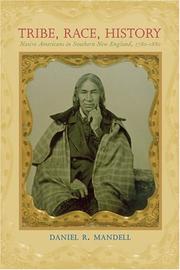| Listing 1 - 5 of 5 |
Sort by
|

ISBN: 0585253781 9780585253787 0803231792 9780803231795 Year: 1996 Publisher: Lincoln : University of Nebraska Press,
Abstract | Keywords | Export | Availability | Bookmark
 Loading...
Loading...Choose an application
- Reference Manager
- EndNote
- RefWorks (Direct export to RefWorks)
The encounter of natives and colonists in New England is a rich source of folklore and scholarship. The story, which usually ends with the defeat of Metacom (King Philip) in 1676, tells of how the natives were overwhelmed by the colonists. That picture, though rich and deeply tragic, is misleading. Disease, economic and ecological intrusion, and political and military pressures did alter native life. Some groups were largely destroyed or driven out by the English. But. Many others persisted in the region, as villages or as networks of families and individuals on the margins of colonial society. Their history offers a new and enlightening view of eighteenth-century New England. Behind the Frontier tells the story of the Indians in Massachusetts as English settlements moved past them between 1675 and 1775, from King Philip's War to the Battle of Bunker Hill. Daniel R. Mandell explores how local needs and regional conditions shaped an. Indian ethnic group that transcended race, tribe, village, and clan, with a culture that incorporated new ways while maintaining a core of "Indian" customs. He examines the development of Native American communities in eastern Massachusetts, many of which survive today, and observes emerging patterns of adaptation and resistance that were played out in different settings as the American nation grew westward in the nineteenth century.
Indians of North America --- Gender & Ethnic Studies --- Social Sciences --- Ethnic & Race Studies --- American aborigines --- American Indians --- First Nations (North America) --- Indians of the United States --- Indigenous peoples --- Native Americans --- North American Indians --- History --- Social conditions. --- Cultural assimilation --- Social conditions --- Culture --- Ethnology --- History.
Book
ISBN: 1421437120 Year: 2020 Publisher: Baltimore : Johns Hopkins University Press,
Abstract | Keywords | Export | Availability | Bookmark
 Loading...
Loading...Choose an application
- Reference Manager
- EndNote
- RefWorks (Direct export to RefWorks)
"This book chronicles the decline of the American foundational idea that a relative equality of wealth for citizens is essential to a well-functioning republican government. The author explains how egalitarianism gave way over time to an acceptance of economic disparity and hierarchy as a social reality in American society. The book provides a historical perspective on the gap between rich and poor that characterizes the contemporary United States"--
Equality --- Social classes --- Income distribution --- History. --- United States --- Economic conditions

ISBN: 0801886945 9780801886942 Year: 2008 Publisher: Baltimore Johns Hopkins University Press
Abstract | Keywords | Export | Availability | Bookmark
 Loading...
Loading...Choose an application
- Reference Manager
- EndNote
- RefWorks (Direct export to RefWorks)
Book

ISBN: 9780812205565 Year: 2011 Publisher: Philadelphia
Abstract | Keywords | Export | Availability | Bookmark
 Loading...
Loading...Choose an application
- Reference Manager
- EndNote
- RefWorks (Direct export to RefWorks)
Digital

ISBN: 9780812205565 9780812221237 Year: 2011 Publisher: Philadelphia, Pa University of Pennsylvania Press
Abstract | Keywords | Export | Availability | Bookmark
 Loading...
Loading...Choose an application
- Reference Manager
- EndNote
- RefWorks (Direct export to RefWorks)
| Listing 1 - 5 of 5 |
Sort by
|

 Search
Search Feedback
Feedback About UniCat
About UniCat  Help
Help News
News